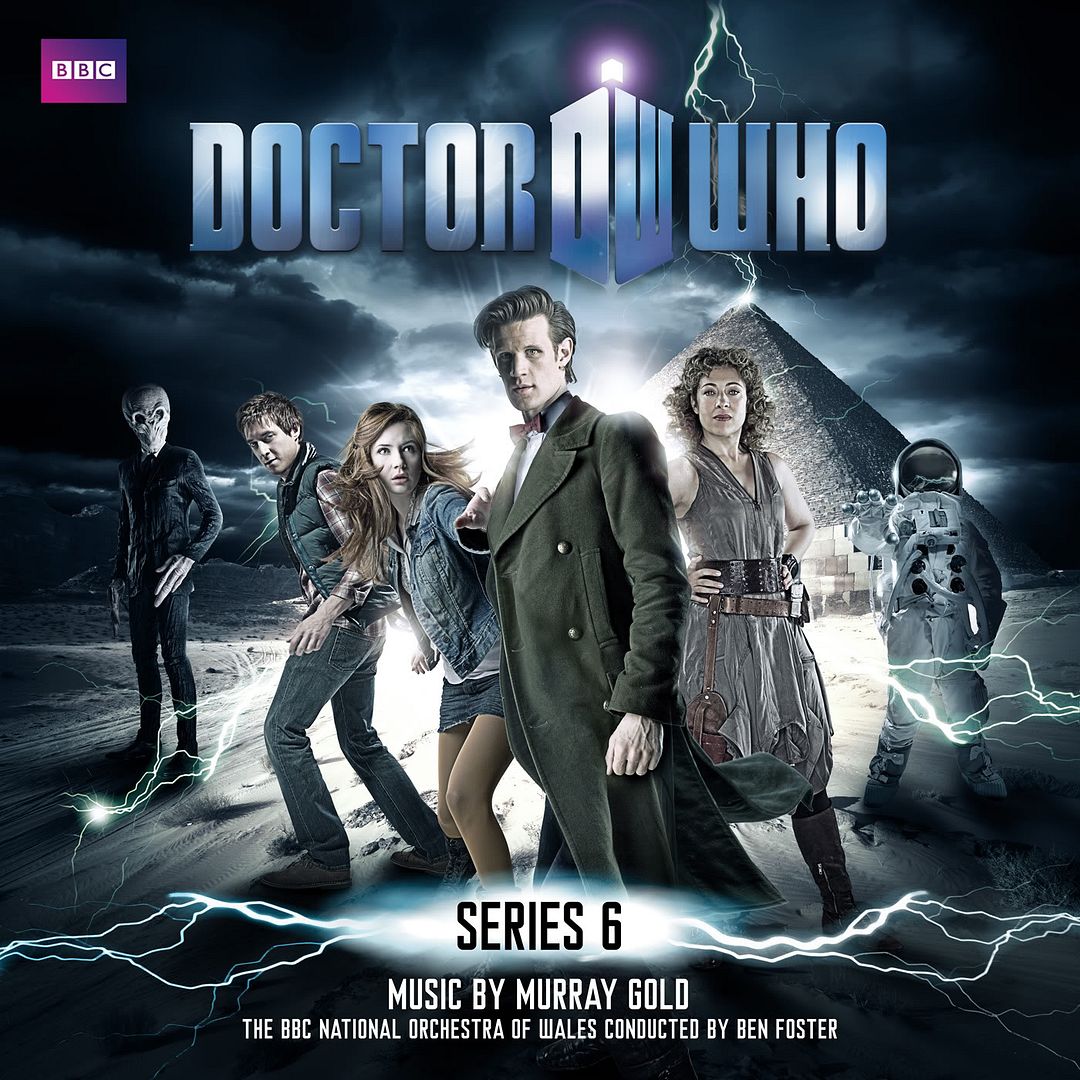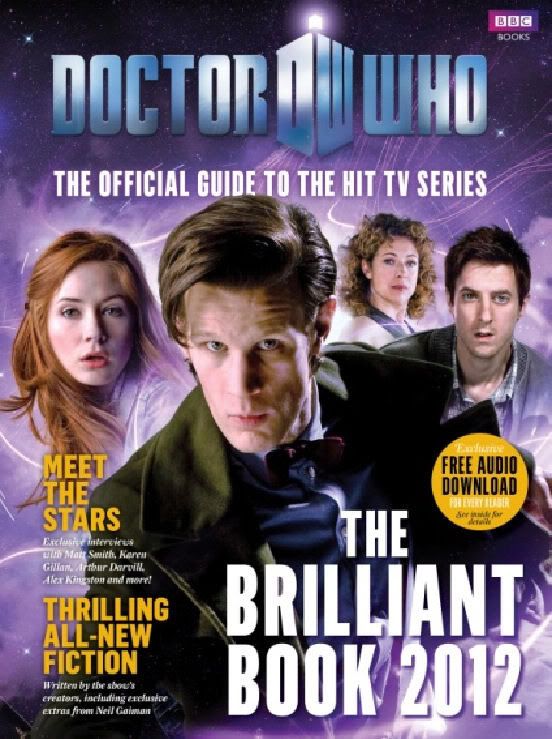Doctor Who: Series 6 Soundtrack
Disc One kicks off in funky nonchalance with some familiar chords performed by Murray himself on electric guitar. A casual but charged percussive riff joins in, before the whole orchestra explodes into a thrillingly revamped version of the Eleventh Doctor’s theme – “I Am The Doctor In Utah”. With track two, “1969”, we find ourselves in tense, mysterious “high noon” territory. The solo trumpet and the cloudy guitar dissolve into a magical, pained vocal as the Doctor begins to regenerate.
Another standout track is “Help Is On Its Way”. The musical tone of these first two episodes is very consistent, and here the guitar returns with a swinging riff, while violas and violins drive forward with that familiar semiquaver figure that dates back to Series Three and “All The Strange Strange Creatures”. Somehow swanky, somehow sleazy, the brass instruments slide and swing their way in, as we are introduced to Canton (the younger). The rest of the track is a subdued but forceful string and synth underscore, building to several peaks.
One of my very favourites, “I See You Silence” is the music from when River is cornered at the top of the skyscraper. The repetitive, taunting guitar motif at the start of the track perfectly echoes Canton’s sing-song call of “Doctor Song!” The track is a fuller mix than the version used in the episode, and features a funky, guitar-augmented version of the forthcoming “Majestic Tale”.
The Curse of the Black Spot’s offering is excellent; an ominous start, some swashbuckling action and an enchantingly sweet but deadly vocal performance as the Siren by Halia Meguid. Add to that some vigorous fiddling by Eos Chater, and you’ve got yourself the perfect score to a pirate romp.
The Doctor’s Wife also has a good selection of tracks, which work perfectly in the episode, which is perhaps surprising given the recording circumstances explained in Murray’s notes. I love the magical, lilting waltz of “My TARDIS”, but I was slightly disappointed that it was cut short, without venturing into the guttural cello and drum-machine vamp from Amy and Rory’s chase through the TARDIS corridors. I can’t complain though – there is enough terrific material packed into this album to more than make up for it!
That said, there is a lot of material from The Rebel Flesh and The Almost People – perhaps too much. The tracks from these episodes are all quite similar-sounding, and not especially memorable. That’s on first listen though – given time, I have a suspicion I will grow to love these tracks just as much as the others. The last track from this story, “Loving Isn’t Knowing”, is a suite containing some really great music: the vulnerable love theme with tearful violin; the gorgeously simplistic yet soaringly lyrical return to “Amy’s Theme”; the shocking and heart-wrenching music from the realisation that Amy is a Ganger; and the terrifying Madam Kovarian music as the real Amy wakes up on Demons’ Run.
The music from the mid-series finale, A Good Man Goes To War, is wonderful. It’s hard to believe that this is not the full orchestra and just a “good sized band”. “River’s Waltz” is gentle and sentimental, played on a detuned piano, here with more instruments accompanying it. At the end of this episode, when River reveals her identity to the Doctor, we aren’t told or shown immediately what the revelation is. However, from Murray’s music, we know it’s not a bad thing. As realisation dawns on the Doctor, gentle piano and cello melodies blossom into a beautiful, flowing tune, deepening in grandeur with horns until, as the Doctor inexplicably disappears in the TARDIS, out comes a majestic and moving reprise of the “I Am The Doctor” motif. The final track on this disc, “Melody Pond”, begins with a vocal version of River’s theme as heard in The Impossible Astronaut. The second half of the track is the theme that has accompanied River throughout the series; an emotional vocal with a repeating string pattern, ending with a soaring development and orchestral flourish.
Disc Two begins with tracks from Let’s Kill Hitler. “Growing Up Fast” is brilliantly nostalgic and frivolous, painting the perfect picture of the childhood of Amy, Rory and Mels. With its bouncing acoustic guitars, jumpy percussion and nursery-rhyme melody, it almost sounds as if it could be a theme tune from children’s TV.
“The Blush Of Love” is rich and gorgeous. It sounds like a film score – the attention to detail is remarkable (I suspect credit is due here largely to Ben Foster’s orchestration). I particularly like the way the melody passes between the oboe, flute and violin.
“Terror of the Reich” begins with a bombastic Nazi march. The second half of the track is excellent – a little bit Bond. The bopping drum machine and quirky woodwind perfectly capture the twee-ness of a robot operated by lots of miniature people!
Mark Gatiss’ Night Terrors was the first time we heard the “Tick Tock” theme, presented mainly instrumentally in this episode. There’s something very scary about simple child-like music, particularly as it gradually, barely-perceptibly, gets faster throughout the track, as if it’s liable to go out of control.
The sound-world of The Girl Who Waited was one of slightly out-of-tune electronic sounds, as exemplified in the first track, “Apalapucia”. This was perfect for the strange, clinical setting and the slipping of time-streams. “Amy’s Theme” returns in “36 Years”, in a reflective acoustic guitar version. I can’t hear this track without remembering the glum-looking Rory skipping along to it!
If you thought the sounds of The Girl Who Waited were weird, they’re nothing compared to The God Complex. Murray says in his notes that they decided to go for an electronic score to “emphasise the crooked angles and giddy mixture of merriment and terror portrayed in the episode”. This definitely worked. The result is disorienting, very scary, slightly ironic and just fantastic. That said, I don’t think the Doctor Who Fan Orchestra will be attempting it any time soon!
Gareth Roberts’ Closing Time was a superb follow-up to 2010’s The Lodger. Motifs from the earlier episode returned, such as “You Must Like It Here”, which shows up in “Stormageddon, Dark Lord Of All”, and “Thank You Craig”, which is echoed in “Fragrance”. The sound of Closing Time is much more filmic, and somehow weightier; it really feels as if we are revisiting the world of The Lodger but with a fresh approach, and, of course, the shadow of the Doctor’s oncoming death looming over.
The final episode of the season, The Wedding of River Song, opened with a bang. A montage showing “all of time” happening at once was accompanied by an epic rock track, “5:02 PM”, featuring a loud choir, electric guitars and saxes. In “Forgiven”, the theme from “Melody Pond” (also foreshadowed in Series Five’s “A River Of Tears”) comes to a breathtaking resolution, breaking into a reprise with similar orchestration to “The Sad Man With A Box”. “Time Is Moving” is a funky, jazzy riff on the Eleventh Doctor’s theme, with locomotive-style percussion (appropriate to its usage in the “train-office” scene near the beginning of the episode). The episode’s namesake track is a final reflection on River’s theme, building to darkly emotional horns and gentle flutes and glockenspiel. After a rock interlude, we hear a brief nod to Amy’s child theme, on a beautiful solo flute (in fact lifted from “Amy’s Starless Life”).
And yes – the very last track was put in at the special request of the many Twitter users who asked for it. Murray is quite right – it’s a fitting end to the album, and encapsulates all we love about the Eleventh Doctor and his adventures.
The overall tone of this album is much subtler than any of the previous Doctor Who soundtrack releases. It covers a wide spectrum, but it definitely feels consistent. The music of Doctor Who has been becoming more and more filmic since 2005, and this album is the absolute pinnacle on that front. I look forward hugely to hearing what Murray Gold comes up with for the next series!











